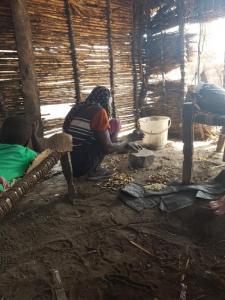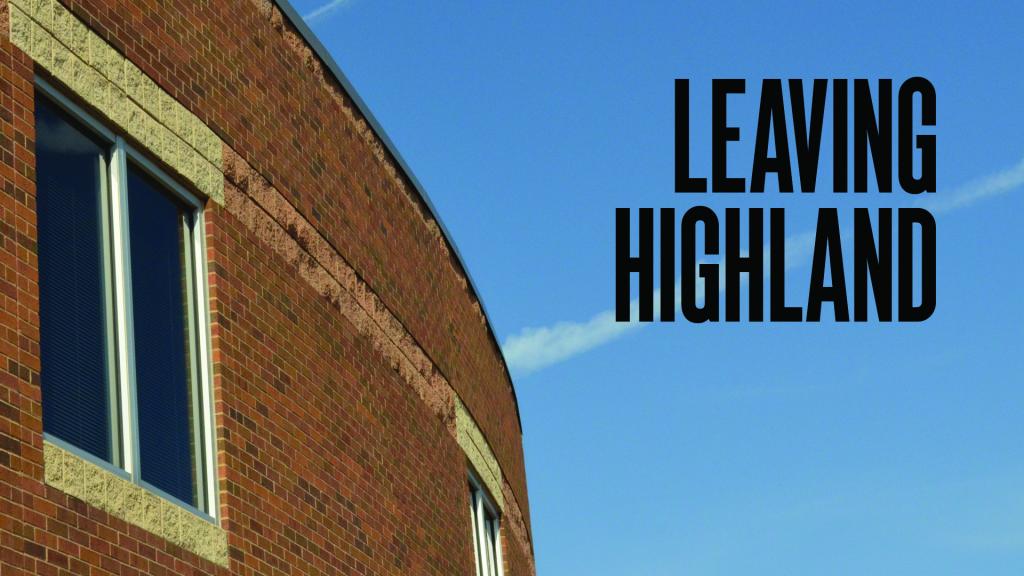
The customs agent riffling through my bag is a woman – tall, stoic, skin like polished obsidian; she is perfectly cool in the pandemonium lapping chaotically around us. Armed soldiers (both government and UN), humanitarian aid workers, teenaged baggage handlers, beggars and politicians are all jostling against us and each other, each wearing expressions ranging from low-grade resentment to acute anxiety to mild boredom. We are all sweating and shuffling to keep our balance, shouting to be heard or straining to hear.
“What are these?” she asks when she sees the stacks of printed material in an unfamiliar language lining my bag. I am trying not to look nervous but I am, just a little. The government can be a bit touchy about materials printed in minority languages these days. You never know when rebels are trying to slip in political propaganda and rally some of the smaller tribes that have managed to stay out of a civil war that has left tens of thousands dead to their side.
“It’s stories from the Bible…in the Mapa* language…” I say. When she hears my use of Arabic she glances up at me briefly for the first time, and I add. “I’m taking them up to the refugee camps with me tomorrow.” She takes one out of the cardboard box it came in from the printer just days ago and flips through it with vague curiosity.
In her hands is not just Bible stories though. She’s holding the first scripture ever published in the Mapa language. Not abbreviated stories, not drafts of scripture used in community testing. Twenty-six portions of painstakingly translated, fully consultant and exegetically checked scripture from the Holy Bible. It’s treasure lying in a cardboard box in my dirty duffle bag on a scratched up immigration table in what a few months ago was literally voted the worst airport in the world.
This is my first time back to North Africa and, quite frankly, I am overwhelmed. Russell has been back three times since our rather dramatic evacuation, at first to assess the damage to the home we left behind (looted like everyone else’s), and then to continue working with and encouraging the faith communities still flourishing in the refugee camps.
I on the other hand have spent the better part of this last year licking wounds that were deeper than I cared to admit, processing nine years of ministry that have hardly looked a darn thing like I expected they would. Russell, God bless him, has insisted on taking the kids for the next ten days. Our lead translator, a North African refugee now living with his family near ours in East Africa, has a broken leg so he is unable to travel along.
So here I am, a mom of three with an alarmingly pink backpack containing a satellite phone, malaria test kits and satchels of oral rehydration solution where the diapers and wipies used to be, with my rusty linguistic skills and razor-sharp discomfort around armed men, walking back into a war-torn country at the height of dry season carrying my precious cargo of the world’s first portions of scripture in the Mapa language.
And in this moment I am thinking: thank goodness we serve a God who specializes in absurdities.
Because this, my friends, feels a bit absurd. It feels complicated and unclear. After nine years of wars and loss and starting over and the never ending battles with immigration officials and complex orthographies it’s tempting to look at this small green book and flirt with the question, is it really worth it?
I think all of us who signed up to follow Jesus ask this question at some point. Is wrestling out this marriage every single day really worth it? Is loving this child in a broken body or this parent with a fading mind day in and day out for the rest of their lives really worth it? Is not giving into despair and apathy at the state of the world really worth it? Is loving my neighbor, forgiving my enemies, caring for the orphan and the widow, turning the other cheek all really worth it?
I really wanted the first time the Mapa community received scripture in their language to be at a big dedication ceremony where throngs of people were singing traditional songs and old men were crying and goats were slaughtered for a big meal and my kids were able to better witness part of why they have such a weird childhood. (I’ve seen videos of that kind of stuff in my own organization’s promotional videos so I know it actually happens somewhere in the world.)
But here’s what happened instead: I flew on a bush plane to a refugee camp where I once lived, my heart a mess of grief and joy and nostalgia. Two old friends rode their bicycles to meet me and we drank some water together in the shade of a scrawny tree and talked for a while about their children and mine, about which of their relatives were currently in the clinic with gunshot wounds, about whether peace would ever come to their people. And then, as the sun started to loosen its grasp on the day, we tied the boxes of scripture onto the backs of their bikes with blue twine and they smiled deeply and simply said Thank you. And they rode home to their families and to their neighbors and to their growing church that meets in a structure made out of sticks and UNHCR tarps with the Word of God in their language bumping along behind them.
As they left a loose thought surfaced in my mind, a memory of the Lenten reading I had fallen asleep to the night before. In Mark 4:26 Jesus says, The Kingdom of God is like a farmer who scatters seed on the ground. Night and day, whether he’s asleep or awake, the seed sprouts and grows, but he does not understand how it happens. The earth produces the crops on its own. First a leaf blade pushes through, then the heads of wheat are formed, and finally the grain ripens…
The words were a kindness in that moment, a gentle reminder that in the Kingdom of God understanding how and why and when is not a precondition for the growth. We scatter seed. We sleep and we wake. We bathe broken bodies and hold back bitter words and don’t treat people the way we think they deserve or pursue all the things in life we think we deserve. We love and forgive and pray and give and struggle anyway.
And, inexplicably, the seeds grow.
From his place neck-deep in the mire of humanity, God looks at us intently and answers our question with a wave of the hand. An invitation to wade out and join him. Yes, it’s worth it. Come into the murky, risky, uncertain mess where beautiful things are happening that you cannot understand.
As the boxes rattled away down the dirt path on the backs of the bikes I felt I could almost see the tiny seeds spilling out of them, haphazardly scattering in the hot wind on their way to who knows where. And I closed my eyes briefly and blessed them on their way.
*Name changed for security reasons









